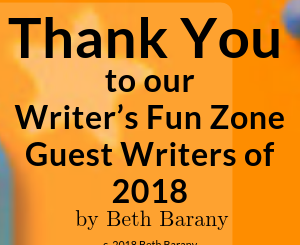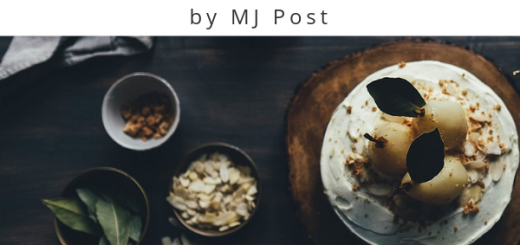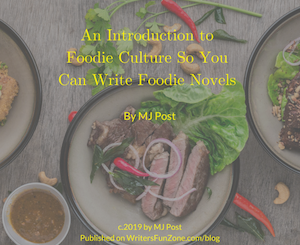Tips on Food Writing by MJ Post
 Today we welcome a new guest writer to Writer’s Fun Zone, MJ Post who is giving us tips on food writing in our fiction. Enjoy!
Today we welcome a new guest writer to Writer’s Fun Zone, MJ Post who is giving us tips on food writing in our fiction. Enjoy!
***
Thanks to Beth Barany for the chance to appear in the Writer’s Fun Zone. Be sure to jump to the bottom for my book promotion. I’ll stay on-topic till then, but I hope you’ll love my novel Chef Showdown.
I’m MJ Post, a romance author known for a Brooklyn attitude — a Brooklyn high school teacher, a denizen of diverse Queens – a comics fan, social media junky, stuff like that.
Nothing I just said suggests that I would turn out as a “food novelist.”
In fact I had already written a food novel before I even know that was a thing. A food novel is a novel which centers on the experience of cooking and eating. The Belly of Paris by Emile Zola is one of the classic examples.
The last winner (co-winner) of the “Next Food Network Star,” Jess Tom, wrote one currently gaining attention; it’s called Food Whore: A Novel of Dining and Deceit.
(I’ll get around to reading them both soon enough.)
So, what’s the point of these?
Food can be a metaphor, or a symbol, or something else, right? Wuzzupwitdat? Well, let’s start with some basics of writing about food. Because you just might want to write your own food novel!
Food needs to be more than just your daily necessity — it needs to be an organizing principle of your . Your lifestyle needs to have food in it – beyond sustenance, food is your passion and your entertainment. We all eat, but I’m talking about eating not just to get it over with — I mean eating as a special activity. I mean seeking out new foods, new places to buy them, and new places to eat.
A GOURMAND
If this is a part of your life, it makes you what we call a GOURMAND (a lover of food.) Gourmands don’t just get some takeout and stuff it in their faces. They keep track of what they ate and where, discuss it with friends and family, try new restaurants and food markets, share pictures and details in social media, read and write reviews and comment on the reviews of others, plan restaurants in advance at their intended vacation destinations.
Well, you get the idea. (I could go on listing details all day — I’m a detail monster, like most novelists.) So if you are going to write about food, then I imagine that food is already a big part of your day.
Cooking also has to be important to you.
I personally can’t cook well — I’m messy in the kitchen, disorganized with ingredients, I don’t season well, and I don’t eat things that great cooks always eat, like fish and eggs. (Yeah, #MJiscrazy, yo.) However, because of “Food TV,” I watch established great chefs and up-and-coming greats at work all the time. In a way, I’m an outlier because, thanks to TV, I can write about I can’t do it myself.
Ideally, as a food writer, you enjoy cooking, cook often, and like to improve your skills and incorporate new ingredients, tools, and techniques. My former (and maybe future) writing partner Mysti Parker pre-tested all the savory cupcakes in her food novel, Mann Cakes, because her saintly husband Bryan made them all for the family. That’s a good idea. Even if you don’t try everything, you should know what kitchen work is really about. (if you don’t, why would you want to write a food novel anyway?)
Let me just say, I’ve watched a bunch of Hallmark movies with chef characters, and they never, never, demonstrate that knowledge. Maybe the original source material adapted into the movie did, but the TV movies don’t. Entertaining movies, but they aren’t really about food. They’re about the relationships between the characters.
Okay, so you’re a gourmand, and you value cooking
— that’s all the background. How do you progress to writing? The first thing to know is stories are always about character and conflict. So you need someone involved with food as your protagonist. A chef is an easy choice, but surely not the only one. I could have written Chef Showdown with anyone working at The Kitchen Network, my fictional TV studio, as a main character.
For your story, you could choose anyone in the food industry, or anyone who values food as much as you do.
Next, you need a conflict or situation which will require that person to eat or cook. It could be a restaurant business issue, or a food competition, or a rivalry between two food businesses, or just a gourmand who will involve others in lots of eating — so you can describe the food!
This is the fiction writer’s art in general: create a situation about your characters which will interest your target audience. Just make sure there will be cooking and eating involved in the plot.
Now then — how do you handle writing about food itself?
This is tough and will take practice. It sure did for me!
First, read recipes and study ingredients, tools, and cooking methods and learn the vocabulary culinarians use. Then you can deploy all these as specific language in your descriptions. Authenticity in food writing, like in most writing, comes from specific nouns and strong verbs. Using the jargon of the food professional is an excellent idea — just be sure you explain it as you introduce it. You can educate your reader about cooking, recipes, and the food business as you go, just as writers in other genres establish the terminology of their own fiction (like who Lycans are in a horror novel, or what a gadget does in a techno-thriller, for two examples.)
Besides the specific language, use the most precise adjectives you can to describe the food. Words for smell, taste, and texture are fewer in number than words for sight and sound, but if they don’t come naturally to your mind, search for online lists, or even lists in books. Here are a few to start with:
- https://kathytemean.wordpress.com/2009/04/25/101-descriptive-words-for-foods/
- https://hybridrastamama.com/150-words-to-describe-the-taste-of-food-to-children-and-adults-alike/
- https://kathysteinemann.com/Musings/taste/
- https://world-food-and-wine.com/describing-aroma
In Chef Showdown, I focused mostly on using the evocative power of specific details. Here’s an example from my heroine Kacie’s first cook-off against the swaggering Buster:
#beginselection
It was past nine PM when recording finally started with Madame Queen introducing the ingredient for the cook-off: cardoons.
Each of them received a bunch of unpeeled stalks of the thistle-like plant. Leaves and thorns were still attached; there would be some drama available watching the two of them clean the vegetables.
Kacie had prepared cardoons before; she had taken two classes in French cookery and had used them in stews. They were slow to cook. No doubt Buster would know a way around that with the chemistry-set cooking that he favored; she would have to come up with one as well. Cooking in cream was a good idea. A casserole perhaps? She delivered her sound-byte, then headed down to the pantry. To avoid crew overtime, Shelley explained, shopping wouldn’t be filmed this time.
She came back with potatoes, soy and other sauces, kelp, elk, because why not, and the ingredients for a few pickled banchan. That was what side dishes were called in a Korean kitchen. No cooking in cream. That was too slow. Buster had finished shopping first. He had on a game face, offered her a handshake on-camera. “May the best chef win,” he said, expressionless. “Happy cooking,” Kacie answered.
Kacie avoided pricking herself with any thorns while preparing the cardoons for cooking, put them to soak in lemon juice and water. Put on the stovetop grill at the right temperature. Peeled and cubed the potatoes without incident. Stopped to calculate. Cardoons first, in the fry pan, then in boiling water. Braising would soften them up. When they were in the water, she realized it would have been better to chop them up first. She put the elk onto the hot grill pan for the bulgogi. It would have time to rest if she got it cooked early on, and would probably be tasty cold, like venison was.
#endselection
I have never cooked or eaten cardoons. I’ve eaten Korean food but I didn’t sample most of the banchan. I don’t know how to braise food (I can fry) and I’ve never used a grill pan. I’ve eaten venison, but never cooked it. If my scene works as intended, then my use of specific details makes you feel you are in the head of a real top-level chef.
I hope this article helps you get started with writing fiction about food. To talk about writing or tell me how much you like my books, please contact me directly by social media. I’d love to obsess together about cooking and food!
***
ABOUT THE AUTHOR
MJ Post (pseudonym) is a Brooklyn high school teacher and writer from Queens, NY. Educated in the South with an attitude straight out of Bensonhurst and Bay Ridge, MJ writes contemporary new adult romance and romantic comedy with a multi-regional flavor. MJ is happily married.
MJ’s work includes five romance novellas with Mysti Parker, one solo romance novel, and under her real name, five novels and two nonfiction books as well as miscellaneous other collections.
MJ’s novel Chef Showdown: A Romance, two young chefs fall in love while competing on a reality TV cooking show under the watchful eye of the toughest judge imaginable. It will make you hungry for some love and some great food.
Amazon author page: https://www.amazon.com/MJ-Post/e/B074HX7TJK/ref=sr_ntt_srch_lnk_1?qid=1540345235&sr=8-1
Readers’ group and street team: https://www.facebook.com/groups/432743907149227/
Author page: https://www.facebook.com/MJ-Post-Author-302156203319243/
Newsletter signup: http://eepurl.com/dyVqqz
Instagram: http://www.instagram.com/MJPostAuthor
Twitter: http://www.twitter.com/MJPostAuthor







Thanks for linking to my post on 300+ Ways to Describe Taste, MJ!
I’ll pass your comment on to MJ! thanks for stopping by the blog!
Hi Kathy. Your post is excellent and perfect for the examples I need, so I was honored to use it. Feel free to friend me on FB!